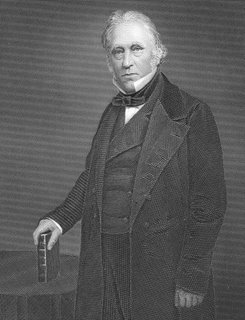 This posting is part of a series on F W Boreham and the authors who influenced his literary style. This article is the second of two instalments on the historian, Thomas Macaulay (1800-1859):
This posting is part of a series on F W Boreham and the authors who influenced his literary style. This article is the second of two instalments on the historian, Thomas Macaulay (1800-1859):Daydreaming Historian
Macaulay’s childhood tendency to daydream enabled him to imagine himself in historical places (ancient Greece) or amid events (the French Revolution) and led him to compose conversations with great people of the time. This imaginative gift, which he retained throughout his life, contributed to his “strongly developed sense of the concrete in pictorial form and the capacity to animate into forward motion in time, motives, characters and situations”.[1] Macaulay wrote in his journal about his “strange habit” of daydreaming to which he imputed a great part of his literary success.[2] While this added colour and drama to his writing, John Clive believed that it was “here the historian’s fantasy life ... tended to let him down” leading to “inaccuracies” and “unfair bias”.[3]
Allusive Style
In the opening sentence of one of his editorials on the life of Lord Macaulay, Boreham exhibited many of the traits of his subject when writing, “A boy of wide-open eyes, excitable temperament, and swift, impulsive movement, Macaulay was five when Nelson laid down his life amidst the glories of Trafalgar, and fifteen when Wellington finally overthrew Napoleon at Waterloo”.[4] Boreham’s introduction resembles Macaulay’s abundantly allusive style in which there is a frequent comparison or contrast with a literary figure or historic scene. This opening paragraph referred to the glories of England (which is a dominant theme with both these writers) and displayed dramatic detail and visual images rapidly joined to give a sense of vigour and movement. Boreham continued in this editorial in the strong narrative style that was the hallmark of Macaulay’s writing and asked, “Is it any wonder that the pages that passed under his pen became infected by the fever of his inexhaustible virility? There is a throb in every sentence.” Boreham concluded in Macaulay manner, pressing home his points like an orator and building to a resounding peroration:
"There was the rational Macaulay, who was generally wrong, and there was the romantic Macaulay, who was invariably right. Happily the rational Macaulay emerged so seldom that, for all practical purposes, he is a negligible quantity. That pale-blooded, flinty-hearted Macaulay was buried, once and for all, in Westminster Abbey, and has never since been seen; but the real Macaulay, the red-blooded Macaulay, the romantic Macaulay—the Macaulay who, with flashing eyes, waved his hands, brandished his umbrella, smashed the decanters and bit his quill to pieces—will live for centuries; and, living, he will be honoured for the virility with which he visualised a past in which he gloried, and interpreted it for the inspiration of a future that ever seemed to be calling him to give of his best."[5]
Faggot of Thunderbolts
Some critics said that Macaulay was “always cocksure” and his “characters were all drawn in black and white”[6] but Boreham graphically described him as “a faggot of thunderbolts”.[7] While Boreham would never have fitted this description, his confident literary style indicated the measure of his response to Macaulay’s “protest against timidity” and his contention that “the historian’s supreme business in life is to exhibit lions” not to present “lions in curlpapers”.[8]
In Summary
Thomas Macaulay fuelled Boreham’s interest in history that Edward Gibbon had ignited and the force of his writing led to Boreham developing many of Macaulay’s conservative and Brito-centric views about life. Like many of his generation, Boreham’s editorial subjects suggested that he was a diligent student in Macaulay’s school of citizenship. Boreham praised Macaulay as “our severest judge of style” and he developed a writing mode reminiscent of his master’s with its drama, pulse, colour and clarity.[9]
Geoff Pound
Image: Thomas Macaulay
[1] Clive, ‘Macaulay’s historical imagination’, 23.
[2] Trevelyan, The life and letters of Lord Macaulay, 666.
[3] Clive, ‘Macaulay’s historical imagination’, 27.
[4] Boreham, Mercury, 24 October 1942.
[5] Boreham, Mercury, 24 October 1942.
[6] A J P Taylor, Englishmen and others (London: Hamish Hamilton, 1956), 20.
[7] Boreham, Mercury, 24 October 1942.
[8] Boreham, Mercury, 24 April 1920.
[9] Boreham, Mercury, 31 August 1946.


